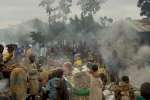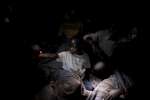- Text size
 |
|  |
|  |
| 
- Français
UNHCR condemns kidnapping of Congolese refugees by LRA rebels
News Stories, 27 March 2015
GENEVA, 27 March (UNHCR) – The UN refugee agency on Friday called for the immediate release of Congolese refugees kidnapped by the Lord's Resistance Army (LRA), which has intensified attacks in the area bordering the Central African Republic and the Democratic Republic of the Congo this year.
A spokesperson for the UN High Commissioner for Refugees (UNHCR) said 15 Congolese refugees from a refugee camp in Central African Republic (CAR) and one Congolese national were kidnapped by the LRA on 21 March from the Democratic Republic of the Congo (DRC) side of the border, where they had been tending their fields.
Thirteen – two women and 11 men -- were released two days later and trekked back to the refugee camp near Zemio in the southeast of the Central African Republic. Some arrived with open wounds and a 16-year-old girl had been raped. Three refugee boys are still missing.
"Since the arrest in the Central African Republic of Dominic Ongwen, an LRA top commander accused of crimes against humanity, in the beginning of this year, LRA rebels have intensified their attacks on villages at the CAR/DRC border," UNHCR spokesperson Karin de Gruijl told a news briefing.
"According to Catholic Relief Services, the LRA has committed over 25 abductions in the month of February in several villages in northeastern DRC, close to Zemio and the border," she said.
Zemio refugee camp hosts some 3,400 Congolese refugees from the Ango Territory (Bas-Uele District), in Province Orientale in the northeast of the Democratic Republic of the Congo. In 2009, they had fled LRA atrocities in the Province Orientale and found refuge in the Central African Republic.
"This week, however, they were once again victims of violence and torture," de Gruijl said. "Upon their arrival, the released refugees were immediately transferred to the health centre in Zemio where they are receiving the necessary medical care. They are still in shock and anxious to learn about the missing refugees."
UNHCR and its partner International Medical Corps are providing psychosocial counseling and the refugee agency has also stepped up efforts to provide refugees with up-to-date information on the security situation and any LRA activities in the region. It is also warning refugees of the risks of moving between the camp in the Central African Republic and their fields in the Democratic Republic of the Congo.
The LRA appeared in Uganda in 1986, established its first base in Sudan in 1993, and spread to the DRC in 2005, before moving further north into the Central African Republic in 2009. Chased by the Ugandan armed forces, remaining LRA rebels have retreated into the forests in southeastern Central African Republic. It continues to wreak havoc and spread terror in the region.
The UN Office for the Coordination of Humanitarian Affairs reported an increase in LRA attacks in both the Central African Republic and the Democratic Republic of the Congo in 2014. In particular, the number of abductions rose from 346 in 2013 to 566 cases in 2014.
More than 180,000 people remain internally displaced in LRA-affected areas in the CRA and the DRC, while LRA violence caused more than 30,000 people to flee to neighbouring countries: 9,232 CAR refugees in the DRC; 3,388 DRC refugees in CAR; and 15,769 DRC refugees and 2,047 CAR refugees in South Sudan.
UNHCR and partners are assisting refugees and seeking lasting solutions, including voluntary repatriation. To date some 640 refugees have registered for a voluntary return programme that will be facilitated by UNHCR. The programme is expected to start in the coming weeks, once the rehabilitation and extension of Zemio and Ango airstrips is complete.














































